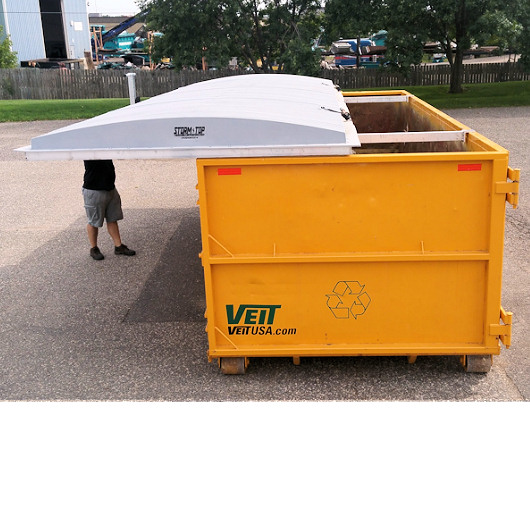
OVERVIEW
Companies which want to stay in compliance with the federal or state laws could greatly benefit from the roll off dumpster covers. The use of such covers will greatly reduce disposal and liability costs while preserving the environment.
Get Compliant Or Risk A Fine!

In early 2017, the EPA released a strict law for the Construction General Permit (CGP). The new rules directly affect companies which use outside waste containers. February 16 was the official starting date for these regulations. The goal behind them was to securely seal off containers during heavy rainfall while ensuring there is no risk of stormwater pollution spreading. The old CGP was from 2012, so something had to change.
Companies with waste container lids have to close them at the end of every business day or during working brakes. The containers without lids must use special covers or other methods to reduce pollution. In recent years, pollution from stormwater runoffs has caused serious environmental damage. The EPA often has to deal with such issues. The new regulations ensure waste containers will have proper protection against similar hazards. Any company which refuses to follow the new law will have to pay harsh fines. They range anywhere between $2,500 and $25,000 per day.
The Dangers Of Storm Water Runoff
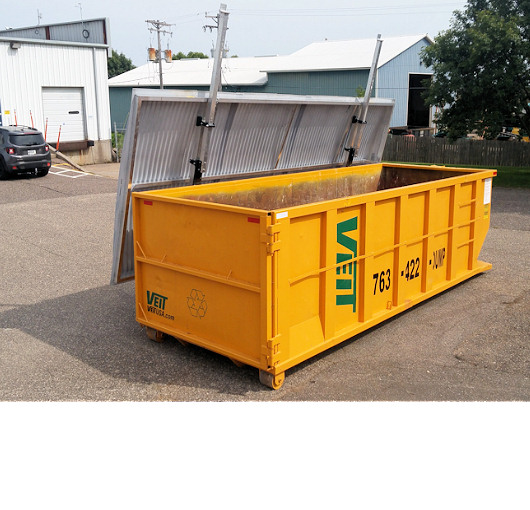
Control Stormwater Runoff
There are six types of activities which can greatly increase the chance of stormwater runoff occurring. One of them is waste management. Every factory or facility uses some system for waste containment and disposal. Therefore, it is of vital importance companies learn about the danger of stormwater runoff. They must store the waste in special areas and remove it without harming the environment.
The risks behind stormwater runoff are high. They could lead to a chain of negative environmental effects. Some of the water from rains or melting snow does not seep into the soil but remains over the ground. While it could partially evaporate, most of that water will begin picking up pollution from cars, buildings, facilities, and other sources. The real problems occur as soon as the water reaches local rivers or lakes.
The federal government has laws on how to cover dumpsters. There are additional regulations on a state or city level. According to the EPA and independent researches, some of the hazardous materials from stormwater runoff could include nitrogen, grease, litter, phosphorous, and more. The water contamination can seriously impact the quality of urban surface waters. Every company which deals with dangerous waste must have a Storm Water Pollution Prevention Plan in place.
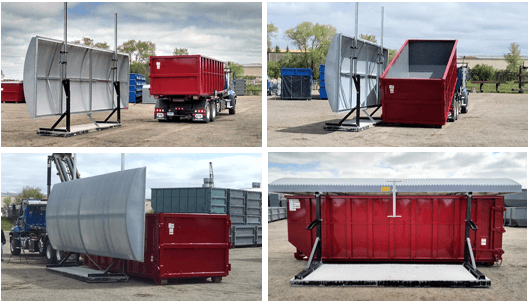
Most Common Issue
One of the most common problems when fighting against stormwater runoff would be dealing with open dumpsters. During heavy rainfall, pollution could escape and cause damage to the local environment. Dumpsters without a cover or proper seal could lead to leakages and water contamination. Therefore, waste containment is the first thing a company has to do to avoid stormwater runoffs.
Alleviating The Headache
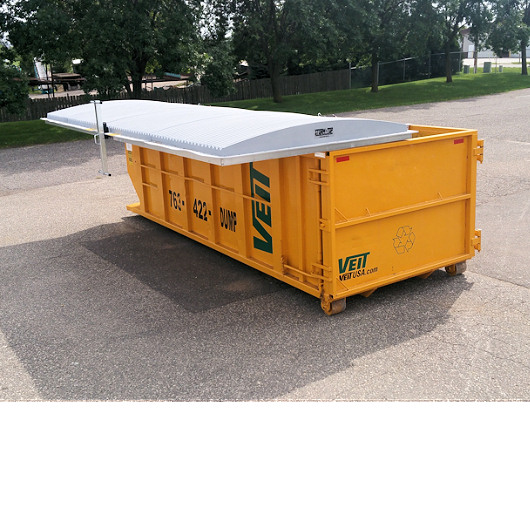
Any company conducting construction, manufacturing, recycling, or similar processes has to deal with waste management. Roll off dumpster covers could be of great help here. They provide an efficient solution when dealing with stormwater seepage. The roll-off dumpster covers are easy to use, affordable, and will protect companies from fines. The covers also protect the dumpsters by blocking rainwater and other chemicals from entering inside. Unlike years ago, there are strict federal and state regulations now. Companies must find a cost-effective solution for covering their dumpsters.
Roll-off tarps or bow systems might work, but they are often ineffective. Such materials could easily tear apart and begin leaking waste. During the cold winter, tarps might freeze and become hard to use. Tarps are not effective during heavy snowfall or rainfall as they would fly away. Companies which are using tarps risk receiving noncompliance fines from the EPA. Roll off dumpster panels are a better solution. They are 100 percent recyclable and do not require any hardware. The dumpster does not need any modifications because the panels will fit easily fit.
Protection From The Elements
Winter Rated
ALCO provides low-temperature protection for the coldest climates.
UV Rated
ALCO provides UV protection for the sunniest and hottest climates.
Wind Rated
ALCO provides extreme wind protection for the wildest climates.
Rain Rated
ALCO provides rain and moisture protection for the wettest climates.
How To Remain Compliant With The Law And Reduce Fines And Fees
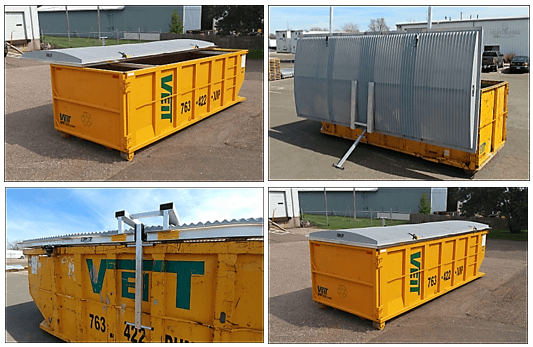
Businesses which want to obtain the No Exposure Certification For Exclusion or ISO14001 could use roll off dumpster covers. Some people from the industry fear they could receive large fines for keeping their dumpsters open. As time passes, the regulations on preventing stormwater runoff are becoming tougher. The roll off dumpster covers will help companies stay in compliance with the law and avoid fines.
The covers are cost-effective because they reduce tipping fees. If the waste soaks or freezes, its weight will be larger as well. Disposing of such waste will cost more. The roll off dumpster covers will offer protection against thieves after valuable recyclables or curious children. The recent EPA regulations will punish companies which allow such incidents to occur. In the end, roll off dumpster covers will save companies a lot of headaches. The covers are efficient, great at protecting the environment, great in keeping facilities clean, and will help owners stay in compliance with the recent regulations.
Challenge Alleviation
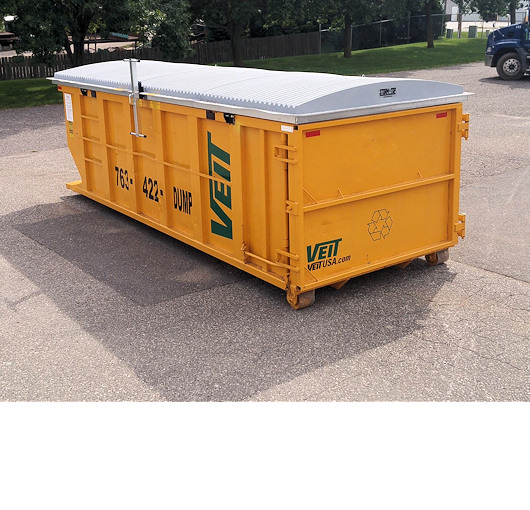
Construction sites, industrial factories, warehouses, and other facilities could make great use of roll off dumpster covers. The covers are easy to use and affordable. They offer a simple, permanent solution to waste management and protect businesses from the new fines. Snow, rain, outside materials, or intruders will have a difficult time entering into the dumpster. While such covers are a common solution, most companies didn’t bother using them in the past because there were little to no regulations. Things are different now. The new regulations from early 2017 are tougher and have strict enforcement over industrial facilities. The need for efficient covers is greater than ever before. The roll off dumpster cover is an ideal solution for companies who want to stay in compliance with the law and avoid unnecessary fines and fees.
Most industrial facilities choose to use a roll-off tarp instead of a proper cover for their dumpsters. While the tarps could last for a while in an area with a calm climate, they will quickly begin to ruin themselves as soon as heavy snowfall or storms arrive. The tarps are not a good solution if a company plans on using them often. They are quick to sag, leak, or tear apart. For industrial complexes in colder regions, the winter will be troublesome. The tarps will freeze and become difficult to work with. These companies risk noncompliance with the new CGP regulations from the EPA. The roll off dumpster panel is a different story. It will last over time, endure harsh storms, and keep the waste in check. The panel requires no modifications or hardware during its installations.
Reduce Fees And Avoid Fines
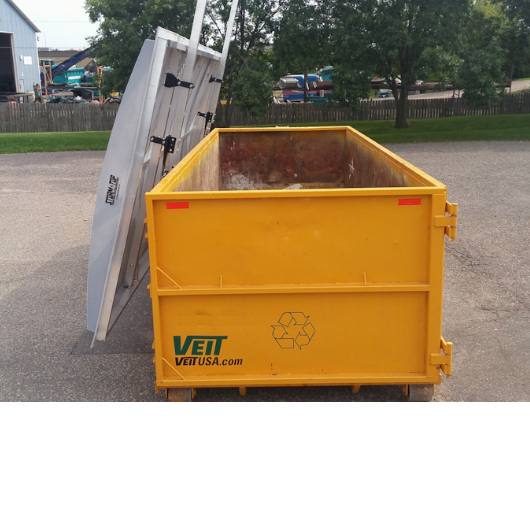
Businesses obtain SWPPP Certification and ISO14001 thanks to the roll off dumpster covers. The stormwater regulations are tough and threaten any noncompliance company with serious fines. Even the industry leaders are taking action in covering their open-air dumpsters. Purchasing our roll off covers would be the right solution. They will help make your business fine free and help keep it in compliance with the CGP regulations from the EPA.
Some companies result in tipping the visiting inspectors and thus avoiding fines. However, the roll off dumpster covers follow the law 100 percent. They will keep you out of harm’s way. The covers we offer are cost-effective for other reasons too. If an open-air dumpster’s waste gets soaked in water, or ice starts appearing, the weight will go up. Therefore, you will have to pay extra disposal fees.
Sometimes, dumpster divers will search for recyclables and end up making a mess. Although you are not directly responsible for it, the CGP regulations might still accuse you of noncompliance. Save money from potential fees by preparing in advance. Smaller disposal fees, fewer liability issues, and a complete lack of fines. Saving money is not the only important thing. You will also keep your industrial facilities clean and protect the local environment. Make the right choice and use our roll off dumpster covers.
What Are The Best Management Practices For Erosion And Sediment Control?
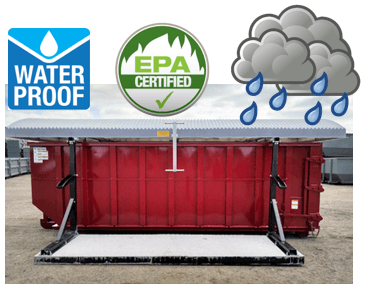
The best management practices are the most effective and practical methods in dealing with nonpoint sources pollution. EPA says there are different types of BMPs depending on what sites a company conducts operations as well as if the area is flat or has slopes.
Normally, areas with slopes require more erosion controls. While flat and small areas also need protection, their costs are lower. Companies must use BMP solutions to deal with stormwater runoff issues.
Here, you will find a few BMPs which could be of great help in dealing with erosion and sediment control:
BMP Locator
The BMP Locator. This online tool will help you find instructions for stormwater BMPs from EPA or state agencies. You can select a category, subcategory, and a source. There is a full guidance manual from EPA here. It will help you identify the best management practices for construction activities and show how to prevent stormwater pollution. You will learn how to:
- Collect site information
- Describe the construction activities
- Prepare a site map for pollution prevention
- Do different measurements to determine the runoff coefficient
- Comply with state and local requirements
- Implement controls
- Prepare plans for maintenance, inspection, and major activities
New Jersey BMP Manual
The New Jersey BMP Manual From April 2004. Here, you will find the different, mandatory stormwater management standards. The manual provides help in addressing the standards and preparing the necessary protection. You will find examples of what to do in specific scenarios. While these methods are worth reading and following, there is nothing stopping businesses from discovering and implementing other management practices for achieving the NJ standards. The New Jersey Departments of Agriculture, Environmental Protection, Community Affairs, and Transportation worked together to provide the manual. Municipal engineers, consultants, contractors, and environmental organizations also took part in the process.
National Storm Water Database
The National Storm Water BMP Database. It provides access to performance data from around 700 BMP archives. Here, you can find studies, performance analysis results, tools for use, monitoring guidance, and other publications. You can search, read, and download the information. As time passes, more studies make their way to the database and enrich it. The database is available thanks to the Urban Water Resources Research Council, US Environmental Protection Agency, American Society Of Civil Engineers, The Federal Highway Administration, American Public Works Association, Wright Water, and Geosyntec.
